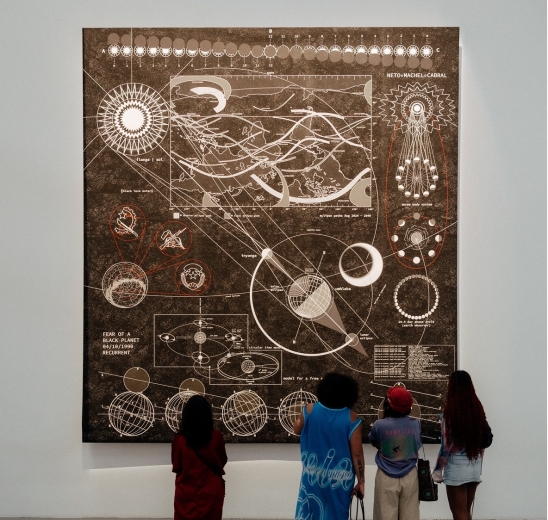Many aphoristic references proclaim the affinity of the two great disciplines that have been brought together for this conversation: art and science. As ways of accessing the world and as sophisticated means of recording and processing it, art and science are perhaps the two areas that most express the curiosity and imagination that characterise the investigations we embark on to think about life and possible futures.
Nolan Oswald Dennis, one of the artists featured in the Black Ancient Futures exhibition, and astrophysicist and science communicator Pedro Russo, a member of the Ciência Viva/Pavilhão do Conhecimento board and assistant professor at Leiden University, are invited to reflect on these and other themes at MAAT, based on the artist's work.
Large-scale visual compositions in black and white, the artist's drawings use scientific data to create fictionalised languages, seeking to induce people to look at the sky and the earth, the past and the present, the disasters of the colonial past, and issues of racialisation and class, developing a discourse for the future. In the case of one of the works conceived specifically for this exhibition, for example, the artist explores a real event that is transformed into a symbolic landmark: the total eclipse of the Sun (which will take place on 2 August 2027), which will be observable throughout the Sahara, a borderland of separation and union between North and sub-Saharan Africa.
With: Nolan Oswald Dennis, Pedro Russo and Camila Maissune
Hours: 18h30-19h30
Duration: 60 minutos
Capacity: max. 60 people
Language: English
Price: 15€ (The ticket for this performance grants access to all exhibitions on the same day)
MAAT Friends: 25% discount
Nolan Oswald Dennis (Zambia, 1988) lives and works between Johannesburg and the United Kingdom. His works expose the modalities of action of colonialism and how the latter continues to influence contemporary social and political structures, impacting the organising infrastructures of society. Through a language of diagrams, drawings and structural models, he imagines alternative futures, creating utopian (and also dystopian) visions of future societies. Dennis develops a grammar of world building: using indexical, analytical and educational devices as enigmatic tools to study possible meanings. Through his diagrams, the artist provides a unique and captivating way of visualising and understanding the intrinsic and often hidden dynamic that defines our world. These diagrams allow various things to be interrelated, forcing us to think about unconsidered objects and conveying complex ideas with simple shapes. This approach invites spectators to engage with the ideas presented, demanding an in-depth analysis and interpretation of the relationships between bodies.
Pedro Russo is a University Professor in Astronomy & Society at Leiden University, the Netherlands and a member of the board of directors of Ciência Viva, the Portuguese National Agency for Scientific and Technological Culture. Pedro was the global coordinator for the United Nation's International Year of Astronomy 2009. Pedro has participated and was curator in several art-science projects, such as "Drake Equation", Open Space with the Nederlands Dans Theatre or Ars Electronica. Pedro was a research fellow at the Max Plank Institute for Solar System Research in Germany. Pedro is involved with several international organisations, like the International Astronomical Union, European Astronomical Society, ECSITE. His work has received several awards, including Seeds Special Award 2009, Scientix Best Educational Resource in 2015 and 2016, Most Innovative Educational Activities in 2017 and 2018 by HundrED, 2018 Leiden University’s K.J. Cath Prize and the first NWO Science Communication Award in 2020.[VB1]
[VB1]O orador enviou em EN
